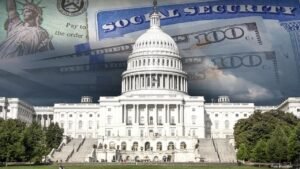The Windfall Elimination Provision (WEP) and the Government Pension Offset (GPO) have long been two of the most arguable factors of the U.S. Social Security system. These provisions, which have an effect on tens of millions of retired public zone workers, regularly lessen the Social Security benefits of people who also acquire a central authority pension based on work now not covered with the aid of Social Security.
For a long time, instructors, firefighters, law enforcement officials, and different public personnel have argued that those policies unfairly penalize them for an entire life of service. Meanwhile, supporters of WEP and GPO contend that the provisions are important to hold fairness and prevent “double-dipping” in the Social Security system.
As Congress revisits energy reforms to Social Security in advance of the 2033 consider fund depletion, the WEP and GPO debate has all over again moved to the leading edge of national dialogue.
What Is the Windfall Elimination Provision (WEP)?
The WEP reduces Social Security retirement or disability benefits for those who earned a pension from employment now not covered by means of Social Security.
- Who it impacts: Typically, public-sector employees consisting of state or local government people and teachers in certain states who didn’t pay Social Security taxes.
- How it works: The Social Security advantage components is adjusted, reducing benefits by way of as much as 50% of the pension amount earned from non-blanketed employment.
- Maximum discount (2025): $587 per month.
What Is the Government Pension Offset (GPO)?
The GPO applies to spousal or survivor benefits. It reduces these benefits for people who receive a government pension from work now not blanketed by means of Social Security.
- How it really works: The spousal or survivor advantage is reduced by means of two-thirds of the government pension.
- This regularly wipes out the entire Social Security spousal benefit.
Why Do WEP and GPO Exist?
When Social Security turned into created, it became intended for employees who always contributed payroll taxes at some point of their careers. Without WEP and GPO, individuals with government pensions and a few Social Security-blanketed employment could receive disproportionately high benefits as compared to lifetime low-wage earners who contributed at some stage in.
- Prevent “double-dipping” of benefits.
- Align blessings greater fairly across different work histories.
Arguments in Favor of WEP and GPO
- Protects Program Solvency: Reduces stress on Social Security through preventing inflated benefits.
- Equity for Low-Income Workers: Without WEP, government people with pensions ought to get hold of higher benefits than non-public-zone workers with the same income records.
- Consistency with Program Design: Social Security is primarily based on payroll contributions. WEP and GPO make sure benefits are tied to contributions, now not simply income tiers.
Criticism of WEP and GPO
- Penalizes Public Servants: Many affected employees argue they paid into Social Security at some point of a part of their careers, but see benefits sharply decreased.
- Lack of Transparency: Workers often discover the discounts past due of their careers or at retirement.
- Disproportionate Impact on Teachers and First Responders: In states where teachers do no longer participate in Social Security, hundreds lose spousal and survivor protections.
- Unfair to Dual-Career Families: Spouses who worked in both covered and non-blanketed jobs can see anticipated survivor benefits vanish.
Legislative Efforts to Repeal or Reform
- Social Security Fairness Act: This payment, reintroduced several instances in Congress, seeks to put off both WEP and GPO absolutely. Support is strong amongst public-area unions and retiree businesses, but concerns about the program’s value have slowed progress.
- WEP Reform Proposals: Some lawmakers propose changing the modern formula with a proportional approach, calculating benefits more fairly based totally on years of protected and non-blanketed employment.
- Partial GPO Relief: Proposals have protected lowering the offset to at least one-third of pensions rather than -thirds, softening the impact on surviving spouses.
Who Is Most Affected?
- Teachers in 15 states, consisting of California, Texas, Illinois, and Massachusetts, in which college structures regularly do no longer take part in Social Security.
- Police officers and firefighters included by way of unbiased pension systems.
- Federal employees hired earlier than 1984, under the Civil Service Retirement System (CSRS).
- Spouses and widows/widowers of public employees looking forward to Social Security survivor advantages.
Conclusion
The debate over the Windfall Elimination Provision (WEP) and the Government Pension Offset (GPO) displays a broader query about the way to stability equity and fiscal duty in the Social Security machine.
While critics view those provisions as punitive and previous, supporters argue they are important to keeping program fairness and solvency. With increasing bipartisan momentum in the back of the Social Security Fairness Act, Congress faces increasing strain to either repeal or reform those regulations earlier than the decade ends.
For now, millions of retirees especially teachers and public employees continue to await relief, hoping that the next phase of Social Security reform will deliver long-promised fairness to those who served the public faithfully.
FAQ’s
Does the GPO continually remove spousal benefits?
Not constantly, however in lots of instances the two-thirds pension offset wipes out the entire Social Security spousal or survivor benefit.
Which state’s employees are most affected?
Teachers and public-region personnel in states like California, Texas, Illinois, and Massachusetts are disproportionately impacted.
Is Congress in all likelihood to repeal WEP and GPO?
Bills had been introduced repeatedly, however payment concerns and lack of bipartisan consensus have averted passage to this point.



